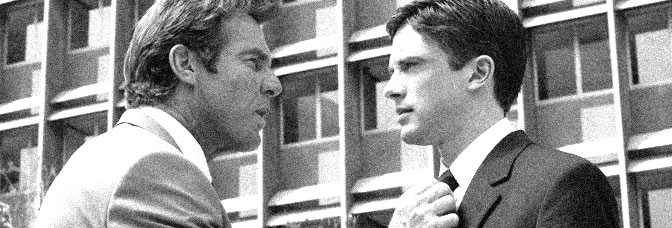At its best, In Good Company is never very good–the soundtrack is one of the worst I can remember–but Chris Weitz’s ineptitude is something to behold. His plot is predictable, his characters are boring, and everything feels like it’s been done before. I mean, who would have thought Dennis Quaid would have found out his job was in jeopardy the same day his wife announced–even though they thought she was post-menopause–she was pregnant again? (And I won’t even get into Weitz’s problems establishing the size of Quaid’s family or non-principal character names).
And Weitz’s idea of innovative scenes–panning back and forth over various people getting fired–has been a film standard since the 1930s and maybe earlier.
Oh, the innovation is the terrible music.
But what makes In Good Company watchable–and occasionally good–is Weitz’s unwavering attempt at making a moderately budgeted studio picture aimed at being a sleeper hit. As an attempt at that genre, it reminds of better films and better filmmaking. There’s no reason Topher Grace should be bad in the movie–in fact he’s pretty good–except Weitz’s hollow writing. Weitz isn’t even a bad director–he’s rather serviceable, though it’s sad to see–embarrassing, really–a director use “Salsbury Hill,” and poorly, so soon after Vanilla Sky. But given the rest of the soundtrack, it isn’t a surprise.
The problem’s with too much content and not enough development. There’s a movie in Quaid and Marg Helgenberger having another kid late in life (Helgenberger’s in it so little, I don’t even think she has a conversation with either of the daughters), there’s a movie about Quaid schooling his up-and-coming (but emotionally devastated due to absent father and disinterested mother household) younger boss, there’s even a movie about the successful, recently divorced twenty-six year-old who falls for his college freshman girlfriend (but she’s not ready for it). With a limited cast of characters, I’d say all of those stories are mutually exclusive. Too much gets sacrificed or contrived to make them fit together.
Scarlett Johansson, who’s proved she can play this kind of character in Scoop, obviously needs some direction. David Paymer’s got an okay, if unspectacular small role, as does Philip Baker Hall. Clark Gregg, as the corporate climber, fails.
The other failing aspect of In Good Company is the unreality it exists in. There are constant lay-offs and firings, but severance packages are never discussed.
The ending to the film is really quite dreadful, enough I wanted In Good Company to be worse. It’s bad, cheap, predictable and soulless. But it’s competently produced (if poorly written).
 ★
★
CREDITS
Written and directed by Paul Weitz; director of photography, Remi Adefarasin; edited by Myron I. Kerstein; music by Damien Rice and Stephen Trask; production designer, William Arnold; produced by Paul Weitz and Chris Weitz; released by Universal Pictures.
Starring Dennis Quaid (Dan Foreman), Topher Grace (Carter Duryea), Scarlett Johansson (Alex Foreman), Marg Helgenberger (Ann Foreman), David Paymer (Morty Wexler), Clark Gregg (Mark Steckle), Philip Baker Hall (Eugene Kalb), Selma Blair (Kimberly), Frankie Faison (Corwin) and Ty Burrell (Enrique Colon).
RELATED

Leave a Reply